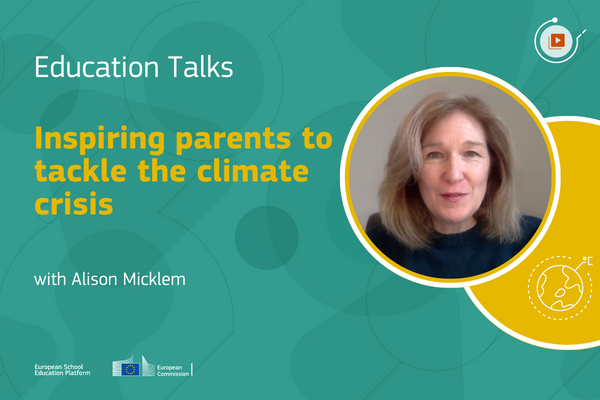Education Talks: Inspiring parents to tackle the climate crisis

Hi, my name is Ally Micklem and I'm advocating for a whole-school approach to education for sustainable development.
When we arrived at the European School, I volunteered to help improve communications at the Parents Association. I'm now the Vice President, and I'm also the co-secretary of INTERPARENTS, which is the umbrella group representing parents of more than 28,000 pupils from our schools across Europe. Like many people I've been carrying climate anxiety for years without really knowing what to do with it. As a former teacher, it was clear how important education for sustainable development would be for my children. The trouble is we don't have time to wait for our children to grow up and save the world. We need politicians, bankers, and businesspeopleto make changes to our systems now.
And who are these policymakers, bankers, and businesspeople?
They're us. They’re the parents. So I was lucky to meet another mum, Denise, at the school bus stop. Together, we felt emboldened to volunteer to act as sustainability consultants for our school director. We combined several approaches to develop our strategy. We interviewed key stakeholders and reviewed current activities. We researched educational frameworks and looked to other schools for inspiration. And we also studied the UNESCO goals. We sifted through this research and gathered the results into a strategy called ‘Building the future that we want’. It has a vision, a mission, and 23 measurable targets. There have been challenges to implementing this vision. Schools are very busy and complex places, so it can be challenging for any director to hold regular whole-stakeholder meetings.
This work is all about embedding a positive vision together with values and making them visible for all stakeholders to aspire to. Whenever I grind to a halt, I just show up to the next meeting and I find the energy of the group will carry me along. So, we're part of this sustainable transition and it's really important that our stories get out there. We have two types of targets nested under three strategic pillars. The first are those projects that we were doing anyway, that can be improved or expanded or rebranded to create a bigger institutional impact. And the second are novel projects.
Under our Protecting Our Planet pillar, there was already a plan in progress to fit solar panels in our school. But the engagement process sparked more strategic thinking, and later on the JRC (EC’s Joint Research Centre) created a brilliant programme for secondary students to measure the energy that we were saving with our panels. Under our Education pillar, we've included communicating more widely and in more depth around our school's mental health and wellbeing policies, as well as integrating environmental issues into all subjects. We believe that pupils and teachers deserve to work in environments which help them thrive.
We all need to be well if we're going to face this crisis with optimism and energy, which it needs. Finally, in engaging our communities, we created a target around creating an online meeting space for all parents to connect to. So, if the school wants to engage more parents in its activities, I would just think around the reasons why parents volunteer in the first place. Parents volunteer because they want to be useful. They want to get a little bit closer to the school. We also want to learn something new, maybe make some new friends and bring any expertise we may have to improve things for our children. So, let the parents know that they can be useful. Reel them in with your engaging vision of a better possible future, or ask them to help you create one. I also run the network of parent volunteers from our 13 sister schools as a support and inspiration for us all.
I reached out to the president of each school's parents association and asked them to send someone, which then puts the topic on their agenda too. Finally, I'd say that working on sustainability is a fantastic antidote to anxiety. I've been inspired to make many more personal changes, and anybody who feels anxious about the climate will find the antidote in action. So parents, over to you. I've experienced how every conversation can spark action and how every person has a role to play in facing the climate crisis.
What conversation could you have that could move you and your community one step closer towards building the future you want for your children?
Additional information
-
Education type:Early Childhood Education and CareSchool EducationVocational Education and Training
